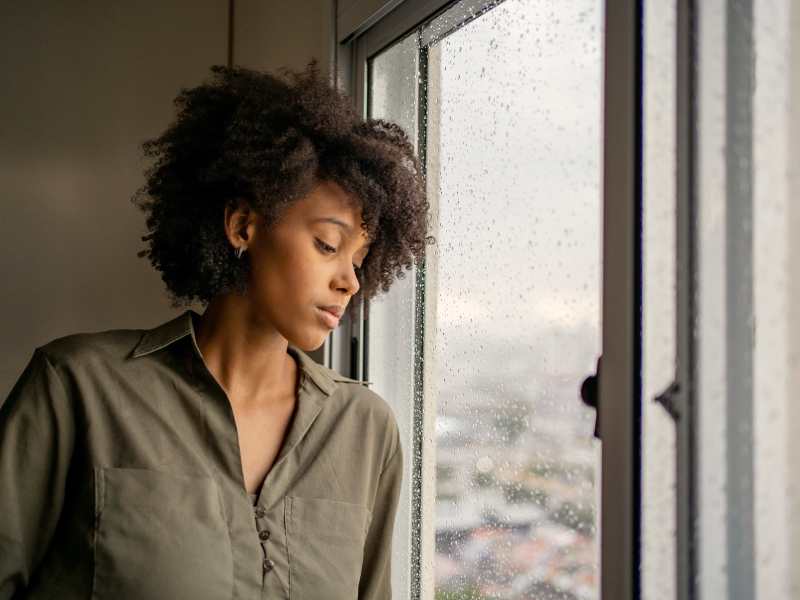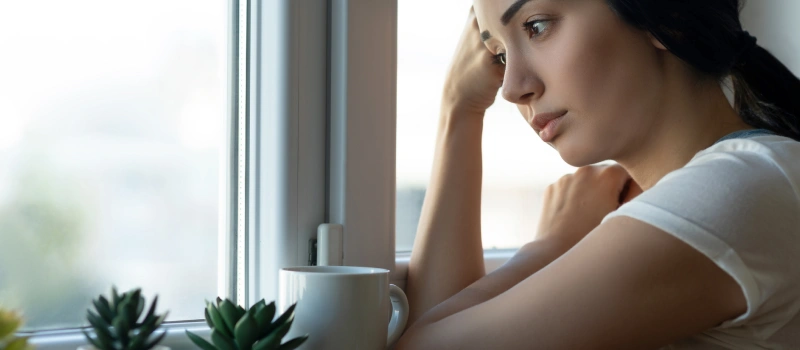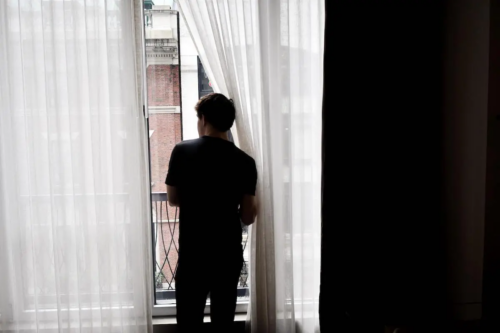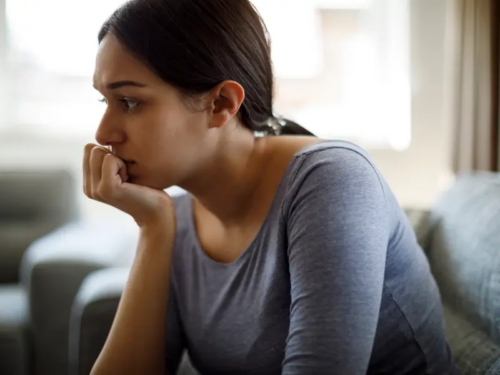
Table of Contents
The Fear of Being Alone: Monophobia and How to Cope
Written By: Charlie Health Editorial Team

Clinically Reviewed By: Dr. Don Gasparini
January 7, 2023
7 min.
It's normal to feel anxious when you've spent too much time alone. But when solitude becomes an extreme fear of even phobia, it might be time to reach out for professional support.
Learn more about our Clinical Review Process
Table of Contents
What is the phobia of being alone?
The phobia of being alone, also known as monophobia, is a persistent and excessive fear of being alone or of being in solitary situations.
It is a specific phobia, characterized by an intense fear of being alone and a strong desire to avoid being alone.
In this article, we’ll discuss the symptoms of monophobia, the different causes of the phobia of being alone, how to treat the phobia, and tips on coping in everyday life. We’ll also explore the emerging relationship between social media and monophobia.
Defining the fear of being alone
Monophobia is different from the occasional blues that come with loneliness; those suffering from monophobia often experience intense feelings of panic or panic attacks, dread, and anxiety symptoms(among other symptoms, which we’ll discuss below) when placed in situations that isolate them from others. This intense form of separation anxiety can be triggered by everything from day-to-day small talk to visits to public places like malls or airports. However, it is not considered a standalone disorder or medically diagnosable phobia. The phobia of being alone can be a symptom of a larger underlying mental health condition such as an anxiety disorder, depression, or PTSD.
Join the Charlie Health Library
Get mental health updates, research, insights, and resources directly to your inbox.
You can unsubscribe anytime.
For someone living with the specific phobia of being alone, this extreme fear typically revolves around issues of safety and being alone in an unpredictable environment. Teenagers and young adults are more likely to experience monophobia due to their socialization needs. While the exact cause for this condition is unknown, some research suggests that it might be linked to a traumatic experience in someone's past, including emotional abuse, physical abuse, sexual abuse, or other forms of traumatic childhood experiences.
Those who struggle with monophobia experience intense feelings of discomfort and dread when separated from people they know or when they are in isolated environments. This constant fear and avoidance can lead to higher levels of stress and anxiety, which can further exacerbate existing mental health problems. Over time, this cycle of avoidance becomes ingrained in the psyche of a person with monophobia and manifests itself in everything from school and work performance issues to disruptions in relationships with friends and family members. It is important for those suffering from monophobia to seek help from trained professionals in order to break destructive patterns of behavior and cultivate an environment wherein one is comfortable enough with their own company.
Signs and symptoms of monophobia
Individuals with monophobia may experience a range of both physical symptoms and mental symptoms when they are alone or when they anticipate being alone. These symptoms can vary from person-to-person and may include:
- Feelings of anxiety, panic, or dread
- Rapid heartbeat
- Sweating
- Panic attack
- Chest pain
- Difficulty breathing
- Restlessness during solitary moments
- Difficulty sleeping
- Avoidance tactics like keeping busy
What causes a phobia of being alone?
The cause of monophobia is not fully understood, but it is believed to be a combination of genetic, environmental, and psychological factors. Some individuals may have a genetic predisposition to anxiety disorders and/or social anxiety, while others may have experienced traumatic events that have led to the development of a phobia of being alone. Furthermore, in some cases, monophobia is a learned response passed down through generations. Regardless of the root cause, it’s important to remember that even if you have experienced significant feelings of loneliness in your life, it doesn't necessarily mean that you are suffering from monophobia.
On the topic of trauma: monophobia may be specifically caused by trauma early in life, sometimes referred to as adverse childhood experiences. Neurological responses to trauma can lead to feelings of extreme anxiety and fear of abandonment when faced with situations such as solitude. In addition, monophobia commonly comes from disconnected familial relationships and support systems that form during childhood into adulthood. This can lead to feelings of inadequacy when faced with being alone and a deep-seated feeling of loneliness.
Along with trauma, physiological and biological factors may also play a role in the development of monophobia; such as higher amounts of cortisol (a stress hormone) in individuals prone to fear or anxiety could contribute to the feeling of dread or panic associated with solitude.

A few final theories behind the origins of the phobia of being alone include:
Socialization
Individuals who have grown up in an environment where they were not exposed to being alone may develop a fear of being alone as adults.
Cultural influence
Some cultural and familial values can influence the development of monophobia. For example, some cultures place a strong emphasis on being with family and friends, which can lead to feelings of anxiety and fear when alone.
Co-occurring mental health issues
Monophobia can be a symptom of other mental health conditions, such as generalized anxiety disorder or agoraphobia.
Treating monophobia
Treatment for monophobia typically involves cognitive behavioral therapy (CBT) and/or exposure therapy. CBT is a type of therapy that helps individuals to identify and change negative thoughts and beliefs that are contributing to their fear. Exposure therapy involves gradually exposing the individual to the feared situation, such as being alone, in a controlled and safe environment. This helps the individual to learn that they can cope with the situation and that their fear is not as intense as they thought it was.
Mindfulness techniques have similarly been found to reduce symptoms of anxiety and depression in those struggling with a fear of solitude, such as focusing on breathing exercises and engaging in mindful activities that help the individual become connected to themselves whilst maintaining arousal control and positive thinking. The key is to find what works best for you - different treatments may be better suited to different people depending on their individual needs.
Do you need more support with
your mental health?
Charlie Health can help.
Care plans for a phobia of being alone may also include mindfulness and meditation. Learning how to live in the present moment regardless of anxiety, discomfort, or even a phobia is one of the core tenets of mindfulness therapy. Beyond these treatment modalities, some cases of extreme phobia may respond well to a combination of therapy and medication. It’s critical to consult with a healthcare professional before making any treatment decisions. However, by understanding the causes of monophobia and implementing treatments appropriately, it is possible to manage the fear and enjoy life without the feeling that we are constantly "in danger."
Coping with the phobia of being alone
In addition to therapy, there are also several self-help strategies that can be effective in managing the fear of being alone. These include:
Mindfulness and relaxation techniques
These can help to reduce anxiety and improve overall well-being.
Social support
Talking to friends and family about your fears can help to reduce anxiety and provide a sense of support.
Gradual exposure
Gradually exposing yourself to being alone in a controlled and safe environment can help to desensitize you to the fear.
Positive self-talk
Challenging negative thoughts and beliefs about being alone can help to reduce fear and anxiety.
Journaling
Writing down your thoughts and feelings can help you to identify patterns and triggers that contribute to your fear.
Take up a hobby
Finding something enjoyable to distract yourself with can make all the difference when dealing with feelings of loneliness and worry; yoga classes, painting lessons or even learning an instrument might help take your mind off things.
Spend time outdoors
Taking regular walks in nature has been linked to calming anxiety levels.
Get enough sleep
Making sure you get enough rest each night increases overall energy levels throughout the day.
Talk about it
Having conversations with your friends and family about how you're feeling can make all the difference when battling against stressful thoughts.
By following any combination (or all!) of these tips above in addition to getting professional help if needed, individuals living with monophobia will gain effective tools for managing their fears over time and finding peace within themselves once more!
It's important to remember that monophobia is a treatable condition, and with the right treatment and self-help strategies, individuals can overcome their fear of being alone and improve their overall quality of life. It's important to seek help from a qualified mental health professional if you are experiencing symptoms of monophobia
Monophobia and social media
The influence of social media has changed how people–especially teens and young adults– interact and process their feelings, creating a whole new platform for individuals to feel like they are not alone. This has sparked an increase in the prevalence of monophobia, especially amongst young people.
Monophobia can have a detrimental effect on mental health, impacting confidence levels and leading to acute stress or even teen acute stress disorder. If left untreated, it can lead to additional problems like poor lifestyle habits and deteriorated personal relationships. It can also drive people to depression and anxiety, which can lead to further isolation from friends and family.
As teens and young adults are at a vulnerable age physically, psychologically, and emotionally, this fear becomes even more felt and often leads to unhealthy coping mechanisms such as an over reliance on social media (perpetuating a harmful cycle of social media overuse and isolation), substance abuse, or other risky behaviors. It’s important to address why we feel afraid of being alone in order to properly tackle the deep rooted fears that cause it.
Phobia support at Charlie Health
If you think you may be suffering from monophobia, reach out to us today. Our team of expert mental healthcare providers is able to provide comprehensive care for teens and young adults struggling with anxiety and phobias. Read more here about our virtual IOP designed to help young people in need of more-than-weekly therapy.





